
Letter From The Executive Director
Dr. Robert M. Panoff
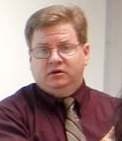
From Excitement to Experience to Expertise
After almost a year of "shake down," we have pushed our building to its limits with a very full summer! With all of our staff, about 30 interns, 25 apprentices, and up to 300 workshop kids, every part of our new space was busy, transforming work spaces to learning and exploration spaces at "Building 7" at Golden Belt. We've identified some real benefits (more writeable walls, the open work spaces, the indirect lighting from the skylights) and some challenges (the blinding glare from some of the skylights) of the new Shodor.
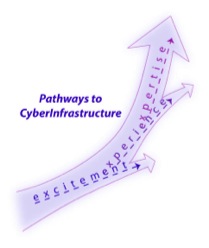
For nearly twenty years, Shodor has blended its education efforts to produce a medley of student experiences, materials development, and teacher and faculty enhancement. This particular issue of InterACTIONS showcases a number of the projects from the summer that help describe the richness of the student experience with learning and teaching through computational explorations. As part of our larger Computing MATTERS efforts (http://www.computingmatters.org), we want to introduce many young people to our way of doing science, so they experience the excitement of discovery, the power of inquiry, and the joy of learning. Most of the stories here are first-person accounts of the student experiences in learning, teaching, and mentoring.
This summer's workshops -led or mentored by Shodor staff, interns, and apprentices -reached several hundred students in North Carolina from the Crystal Coast and Downeast to sites all across the Research Triangle. Extending our efforts to help other states, Shodor staff led workshops in modeling and simulation for both students and teachers in New York, West Virginia, Louisiana, and Maryland. As part of our partnership with the National Science Foundation and its Noyce Teaching Scholars and Fellows program (http://www.shodor.org/noyce ), six American pre-service teachers went with me to the island of Crete to join dozens of teachers from across Europe for a week-long workshop focusing on inquiry based science enhanced by computational thinking. Future workshops, with funding from NSF, for Noyce participants will expand to include Latin America and Asia.
This will be a challenging year as national priorities in science education funding are constantly evolving. Shodor plans to steer a steady course to provide the best environment to transform learning through computational thinking.
All the best,

Bob Panoff
HeartWorks: The Shodor Experience
BY Eric Hardison, Shodor Intern
The youth of our nation provide foreshadowing for our future. Thanks to Shodor, the youth of Pamlico County have a much brighter future! In Pamilco County, Shodor partnered with an organization called HeartWorks. HeartWorks is a non-profit dedicated to providing mental, physical, and health services to underrepresented families in Pamilco County and is located in Bayboro. Pamlico Community College generously donated the use of their computer lab located a few steps from the HeartWorks center. By partnering with HeartWorks, Shodor has not only been able to expand its programs, while providing education and computational experience to students including those from families facing economic challenges. Through the use of computational science, 26 Pamlico County students have been able to learn about mathematics and science.
Initially, the students from HeartWorks were wondering why they were doing "schoolwork" during their summer break, but after the first day they welcomed Shodor with open arms and open minds. In turn Shodor taught the students a number of topics in math and science, including fractals, algorithms, and computer modeling as well as patterns, bell curves, and percentages. Shodor teaches math and science through something all children love: honds on activities combined with computers! When introduced to the idea of "playing" on the computer, the children were extremely excited! As an intern helping with these workshops, I found that the students' excitement became intensified during the activities in which we used AgentSheets, a modeling and simulation software. Students were thrilled to find out how to create heat diffusion and working games by themselves.
Throughout the summer one thing was clear, whether it was on the computer or with good old fashion pen and paper activities (the power went out once during the week), the students were enjoying themselves. HeartWorks students have had the opportunity to learn things that they would otherwise not learn. Shodor has given these students a head start in life, and hopefully, a new love for math and science!
Shodor Participates in STEMposium
This video was made by the Department of Defense to document: "Confront Disaster -- Engage Your Mind -- Save the World," the theme of the first DODDS-Europe STEMposium, an activity of the Department of Defense Education Activty (DoDEA). Drawn from schools on American military bases from all over Europe, 90 high school students took part in the conference which was geared towards a disaster preparedness scenario with workshops focusing on science, technology, engineering, and math (STEM). Dr. Panoff from Shodor presented at the STEMposium to excite and engage students in math and science learning, while serving as a mentor for the teams developing solutions to the crisis scenario.
Dr. Panoff worked with students to build models in Excel and tools from Interactivate to visualize how evacuation plans would be affected by radiation and wind drift related to the scenario.
Mrs. Anita Lang, one of the teachers from Lakenheath, England, wrote to say, "After the STEMposium, my students were asked to present the information they learned and the experiences they had with our school administration. In their presentations, they brought in a lot of the simulations they did with Dr. Panoff and talked about the wind patterns and how the radioactivity would spread. They made several comments like, 'now I see a use for all the math I learned.' Everyone talked about the importance of patterns and predictions. Our principal is a former math teacher and he was very enthusiastic with them about what they'd observed.
"My students definitely applied more math to their engineering models (the ones in my classes) and it was exciting to hear them talk about math as a useful thing, not just a class they have to take to graduate."
Teaching and Traveling: My Summer Experience
BY Eric Aiello, Shodor Intern
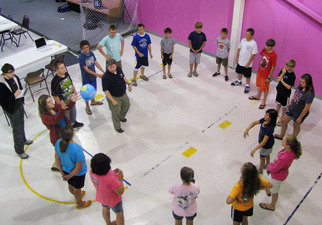
This summer, I had the opportunity to help teach Shodor workshops in both Carteret County, NC and Morgantown, West Virginia. On Sunday June 17th, another intern and I arrived in Carteret County, NC. The following Monday, we began our workshops at The Bridge Downeast Center. The Bridge Downeast is a new youth center, located in Harkers Island, NC, dedicated to providing students with a safe environment to learn, play, and relax. To enhance the learning environment, Shodor donated 10 computers to The Bridge Downeast.
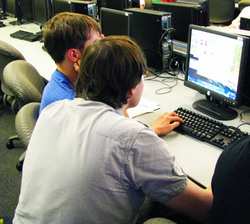
In the workshop I was helping with teaching the "Modeling Your World" explorations to high school students one week and middle school students the next. We also had 2 high school participants helping us the next week with the middle school kids. We had to vary the content for each age group. Students learned to think about approaching scientific thinking from a simple cycle of expectation, observation, and reflection. A big focus of each workshop was using an application called AgentSheets, with the students learning how to create their very own models.
The workshops at the Bridge Downeast were a kind of training opportunity for me to learn to work as a teaching team with Luke Van Oort and Levi Diala with Dr. Panoff providing the mentoring to help us think about teaching and learning. The proof of that team approach was when Levi, Luke and I went by ourselves to West Virginia University for the Governor's Honors Academy (GHA) program, where we taught several groups of high school students the skills of agent modeling.
After I was done teaching these four workshops, thinking back, I found these teaching opportunities to be very positive for both Shodor and myself, personally. These workshops were not taught in Durham, meaning that Shodor's workshops are expanding and are reaching a wider audience. This also means that I got to travel, which was an enjoyable experience. Also, after teaching these workshops, I feel as though I am a much more effective teacher. I look forward to more teaching opportunities during my internship at Shodor.
Where Are They Now? Thomas Dietz
BY Nicole Justiniano, Shodor Intern
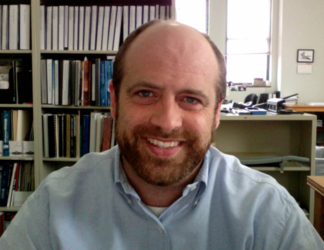
Thomas Dietz began working at Shodor while he was a sophomore at Notre Dame University, in 1997. Since then Thomas has been very busy. He graduated from Notre Dame (with a degree in Architecture and Art History), attended MIT for Architectural Studies in History, Theory and Criticism, writing on the relationship of Church and State architecture at the founding of modern Italy. Thomas also completed several certification programs and continuing education courses, notably completing the four-year Basic Program of Liberal Studies at the University of Chicago. Currently Thomas is working for Duncan G. Stroik, assisting Duncan on "the compiling of his forthcoming collection of essays, releasing a line of liturgical furnishing, and managing the execution of several ongoing church projects."
While at Shodor, Thomas was chiefly a graphic designer for promotional merchandise and websites, and also helped with the production of several research grant proposals. He was involved in the first comprehensive revamp of the Shodor website since its founding a few years earlier. Thomas also helped design the look and feel of Project SUCCEED and Project Interactivate. He also worked heavily on the University of North Carolina Applied Sciences project, as well as the Shodor Computational Science Institute, and then designed the logo for the National Computational Science Institute (NCSI).

According to Thomas, his work at Shodor has helped him in his current career. He says, "Dr. Panoff introduced me to the idea of maintaining an active engagement in academic affairs without holding some sort of collegiate position. I have always tried to keep one foot in the academy throughout my architecture career with occasional lectures, writings, etc. due to this early experience, and I have continued to seek employment in offices that maintain an academic bent." Thomas says that his time at Shodor was "an absolutely amazing experience."
Summertime at Shodor
BY Anwesha Nandi, Shodor Apprentice
Shodor's Succeed workshops are educational programs varying in a range of topics. In the Programming Concepts and Web Design workshops, students can learn about computer science and programming. Web Design students build their own website using HTML and CSS. Programming Concepts participants learn a variety of computer programming concepts such as data structures and functions. Both workshops, popular during the summer months, were offered for middle school and high school students this year. Interested students can also learn how to model various situations using different modeling programs such as NetLogo and AgentSheets if they take Modeling Your World for middle school students. Modeling Your universe is a high school workshop that explores more complicated models through the used of parallel computing. Forensics, another popular summer workshop, allows students to lean about solving crimes using computational tools. This workshop specifically focuses on the use of computational science to interpret evidence and analyze information.
Intro to iPhone Development was one of Shodor's most in demand workshops this summer, teaching students how to create their own apps for the iPhone, iPod, or iPad! Participants learned how to write an app, as well as some computer programming to create their own apps using Apple's development environment and Xcode. They were able to run their applications on simulators and actual devices to see their creations. This workshop was so popular that it was featured on News14 Carolina's Connect a Million Minds.
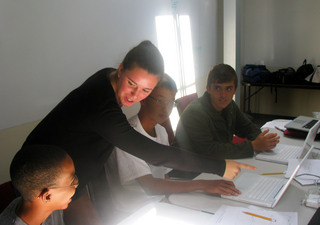
In addition to the above mentioned workshops, Shodor also partnered with Sigma Xi to host two workshops: Math Explorations at Sigma Xi and Explorations in Engineering at Sigma Xi. In Math Explorations, students learned about some of the more interesting applications of math that are often not taught in schools. In Explorations in Engineering students learned about structural engineering, aeronautical engineering, electrical engineering, and biomedical engineering (which includes learning about nano-technology). Although it sounds like a lot, students enjoyed themselves whilst learning how to create a design, make the design, alter the design, and analyze results like real engineers.
Lastly, this summer Shodor again offered the Shodor Scholars Program (SSP). This program provides students with a broad overview of computational science. SSP students look at models built by other people and then build their own. Students also learn about basic numerical methods, scientific programming, verification and validation, and other things about computational science.
All Shodor workshops help students become more successful later in life and teach them valuable skills. The workshops teach students in a way that is different from a classroom setting, one that focuses on creative, computational thinking.
A Shodor Apprentice Experience.
BY Marc Harris, Shodor Apprentice
Shodor is an organization with the goal of teaching computational science to young adults in order to help improve their math and science skills. Shodor normally does this by having students go through one of the various workshops in order to learn the very basics of what they might be doing as an apprentice or intern. After taking a workshop, students can become apprentices for a year, and eventually maybe even move on to being interns. In my specific apprentice class, we have roughly 20 students.
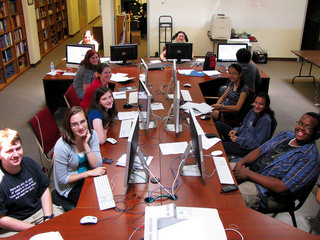
While being at Shodor, I have learned a lot of very useful skills that I can probably implement in any future job. One important skill that I have learned while working as an apprentice is time management. In the various projects that we apprentices have worked on, we have been given a lot of freedom as to how long we wanted to work or what we wanted to include in the project. Wanting to add one hundred and one different ideas to a model is good, but only if you can manage your time when making it. Another great skill set I have learned while working at Shodor is, of course, computer skills. While I have only been here for a year, I have learned many different programs including: HTML, Javascript, PHP, XML, AgentSheets, Vensim, NetLogo, Inkscape, and Gimp. With these programs, I know how to make websites, models, and graphic designs.
Being an apprentice at Shodor has been a very fun and engaging experience. From day one, I have been able to do a lot of hands on activities. I have also learned a tremendous amount about computer software and hardware, which is exactly why I came to Shodor. The people here are also great. I have met a lot of very intelligent and mature students. We are often able to help each other out on projects and learn different ways of solving various problems. Being an apprentice at Shodor has been a wonderful experience, and I hope that I will be able to pass on my knowledge to the apprentices to come next year.
Shodor Offers International Opportunities to Noyce Scholars and Fellows
BY Hillary Stoker, Shodor Staff
Through funding from the National Science Foundation (NSF), and partnered with the National Computational Science Institute (NCSI) Shodor is offering a series of international faculty engagement and professional development opportunities to participants in the Robert Noyce Teacher Scholarship Program and NSF Teaching Fellowship.
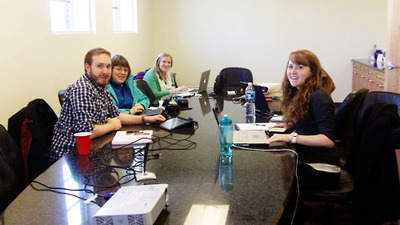
In February 2012 Shodor took a group of pre-service teachers to Dublin, Ireland where they took part in a two-day workshop, located at Dublin City University, focused on inquiry based learning in the sciences. On June 30th, 2012 Shodor again embarked on international travel with a group of pre-service educators, this time to Crete, Greece. Once in Crete trip participants attended The Best Practices in Inquiry-Based Science Education Pathway Summer School organized by the University of Crete Physics department. Workshop participant Amy Jacobson comments about her experience in Greece saying, "I am very thankful to have had the opportunity to connect with and learn from educators across the world. Just having experiences talking with foreign teachers has broadened my perspective about the significance of incorporating interesting, well-developed, and engaging lesson plans."
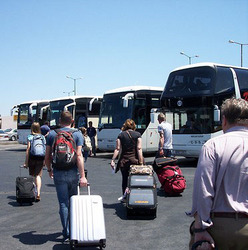
Both of these workshops were designed to introduce participants to inquiry-based learning and educate them on how to implement such practices in the classroom, while also introducing American educators to international educational practices. Zach McCoy, workshop participant, spoke to this point, "I learned a lot in the workshops, I loved the food, touring the cities, and swimming in the Mediterranean, but I learned the most from the people". By offering international opportunities to pre-service and in-service educators, Shodor, The Robert Noyce Teacher Scholarship Program, and the NSF Teaching Fellowship hope to foster both national and international collaboration between STEM educators and institutions.
Funding for this project is projected to continue throughout the next two years, during which Shodor hopes to continue to offer a variety of international experiences for Noyce scholars and fellows.
Together in Education

Together in Education is Harris Teeter's fundraising program for community schools. When Harris Teeter customers purchase groceries using their VIC card Shodor will receive a percentage of those purchase dollars. Visit http://www.harristeeter.com/community/together_in_education/tie_details.aspx to link your VIC card and contribute to Shodor! Shodor's school code is 5588.